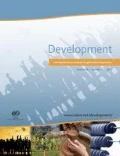Abstract
The outcome on the debt section of the Addis Ababa Action Agenda saw setbacks from the identification of the need to address the governance flaws in the sovereign debt resolution process agreed in the Doha Financing for Development Conference in 2008. On systemic issues, there was also limited progress in reducing the boom-bust patterns in international financial flows behind the most dislocating development reversals in poor countries.

Source: United Nations, 2010, Figure II.4, p. 31
Notes
There was a later attempt to blame poor corporate governance as the cause of the East Asian crisis. This permitted blaming the victims for the tragedy. Later, in the 2007-08 economic crises, it appears that poor corporate governance had also been a factor in the transatlantic economic crises, so ex post it could not have been an explanation specific to the East Asian crisis. See Montes (forthcoming 2017) on why poor governance and corruption (from the failing Suharto regime) could not be the principal explanation for - and a distraction from the appropriate policy responses to - the Indonesian economic crisis of 1997–1998. An IMF independent evaluation office report of IMF Indonesia program, cited in the piece, suggests as much.
References
Montes, Manuel F. 2016 UN-Prinzipien für den fairen Umgang mit überschuldeten Staaten in SchuldenReport 2016. Erlassjahr: 32–34.
Montes, Manuel F. 2017. Indonesia’s 1997–98 Economic Crisis: A Teachable Moment Wasted. In Sovereign Debt Crises edited by Juan Pablo Bohoslavsky and Kunibert Raffer. London: Cambridge University Press (forthcoming).
United Nations. 2003. The Monterrey Consensus. The final text of agreements and commitments adopted at the International Conference on Financing for Development, Monterrey, Mexico, 18–22 March 2002. Available at http://www.un.org/esa/ffd/monterrey/MonterreyConsensus.pdf. Accessed 28 November 2014.
United Nations. 2010. World Economic and Social Survey 2010: Retooling Global Development. Sales No. E.10.II.C.1.
United Nations. 2009. Doha Declaration on Financing for Development: Outcome document of the Follow-up International Conference on Financing for Development to Review the Implementation of the Monterrey Consensus, 29 November to 2 December 2008. Available at http://www.un.org/esa/ffd/doha/documents/Doha_Declaration_FFD.pdf. Accessed 28 November 2014.
United Nations. 2015a. Addis Ababa Action Agenda of the Third International Conference on Financing for Development (Addis Ababa Action Agenda). A/RES/69/313.
United Nations. 2015b. Basic Principles on Sovereign Debt Restructuring Processes. A/RES/69/319.
United Nations. 2015c. Transforming our world: the 2030 Agenda for Sustainable Development. A/RES/70/1.
Author information
Authors and Affiliations
Corresponding author
Rights and permissions
About this article
Cite this article
Montes, M.F. Debt and Systemic Issues: Falling Short of Good Governance Principles at the International Level. Development 59, 83–87 (2016). https://doi.org/10.1057/s41301-017-0094-9
Published:
Issue Date:
DOI: https://doi.org/10.1057/s41301-017-0094-9

